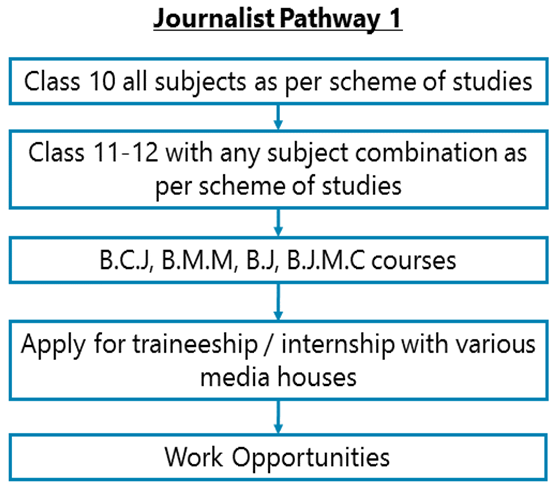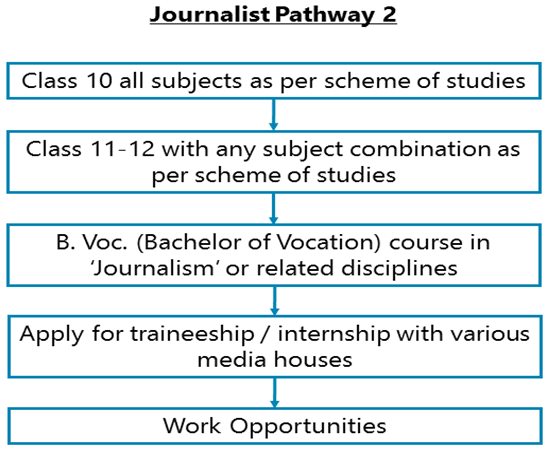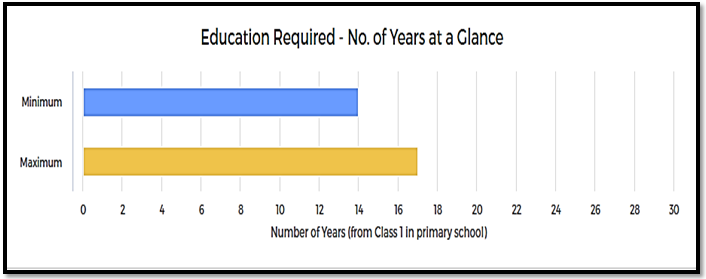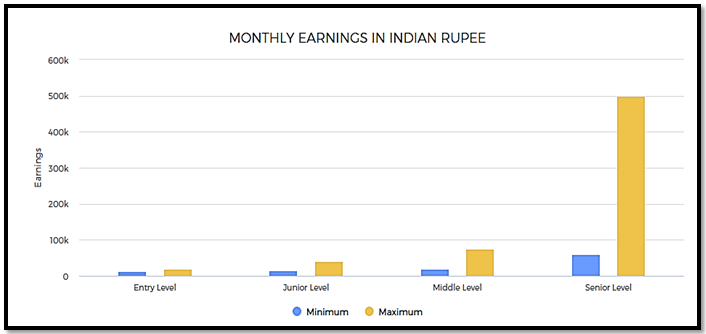Journalist (Vocational)
Entry Level Qualification
12
Career Fields
Mass Media, Journalism & Entertainment
For Specially Abled






 ,
,
Career Entrance Exam
About Career
1 .As a Journalist, you will be working with major newspapers, magazines, media houses, newswire agencies, websites, radio stations, television companies, periodical publishers or journals operating in both online and print media spaces. Your job will be to reproduce first-hand information gathered by reporters, anchors, interviewers, photographers etc., about events, facts, ideas, and people, in a written format. You will have to coordinate your work with news editors, copywriters, marketing executives, advertisement agencies, graphic designers etc. to produce an effective piece of a news report from received first-hand information.
2. You can pursue a career in sports journalism, broadcast journalism, fashion journalism, crime / investigative journalism or specialize in any field of your choice like engineering, education, politics, economics, healthcare etc. Your main duty will be to construct a simple and clear message and convey it through your news report. You should be able to use your social ethics and logical thinking skills to selectively choose what to include in your writing and what to reject. The most important qualifications that any journalist should have are sheer common intellect, good sense of judgment, knowledge of current affairs and decent language skills in English or any vernacular language. As a Journalist, you should be responsible for how to use the power of words as your main duty will be to inform the common masses.
3. Today, all major newspapers, magazine and media houses have an e-presence. This means they can reach a wider audience through their websites or online presence as the modern commoner demands accessible digital news which they can find through their mobile phones or laptops, instead of spending hours on tangible newspapers! Keeping all of this in mind and since social media is the ruling factor today, as a journalist you will have an immense responsibility to ensure that authentic information written in the right way reaches the right audience at the right time through the right medium. The main struggle for you will be to meet tight deadlines and tough work schedules because as in most cases the news items need to broadcast, released or made live within a particular time frame which may be only a few minutes.
Key Roles and Responsibilities:
As a Journalist, you will be engaged with one or more of the following roles and responsibilities:
1. You will be receiving assignments or evaluating tips or leads to create story ideas.
2. You will be researching a story's background information for providing accurate and complete information.
3 .You will be reporting news stories for broadcast or publication, describing the details and background of events.
4. You will be gathering information and data about events through interviews, research, experience or by attending at the news, political, artistic, sports, social, or other functions.
5. You will be reviewing and evaluating notes collected about news events to aggregate pertinent details and facts.
6. You may be investigating developments in breaking news, such as crimes, disasters, or human-interest stories.
7. You may be reviewing audio, written, or video copy and correcting errors in grammar, content, or punctuation, as per prescribed formatting guidelines, word limits and editorial styles.
8. You may be writing on specialized fields such as green technology, medicine, environmental issues, politics, science, arts, sports, business, consumer affairs, crime, religion, or education.
9. You may be determining the length, emphasis, and format of a published or broadcasted story and organizing material accordingly.
10. You may be developing material or ideas for commentaries or columns by interpreting and analyzing current issues, news, or personal experiences.
PARTICULARS | DESCRIPTION |
Name | Journalist (Vocational) |
Purpose | Gather information |
Career Field | Mass Media, Journalism & Entertainment |
Required Entrance Exam | No Entrance Exam |
Average Salary | 150000 - 300000 Rs. Per Year |
Companies For You | Radio Stations, Television Companies, Journal Publishers & Many More |
Who is Eligible | Class 12th |
Career Entry Pathway
Class 10 all subjects as per scheme of studies - Class 11-12 with any subject combination as per scheme of studies – B.C.J, B.M.M, B.J, B.J.M.C courses - undergo traineeship/internship with various media houses
After class 11-12, you can go for B.C.J (Bachelor of Communication & Journalism), B.M.M (Bachelor of Mass Media), B.J (Bachelor in Journalism), B.J.M.C (Bachelor in Journalism and Mass Communication) courses. Then you can apply for traineeship/internship with various media houses. Then you can apply for traineeship/internship with various media houses.
Class 10 all subjects as per scheme of studies - Class 11-12 with any subject combination as per scheme of studies –B. Voc course in ‘Journalism’ or related disciplines- undergo graduate traineeship/ internship with various media houses
After class 11-12, you can go for a B. Voc. (Bachelor of Vocation) course in ‘Journalism’, ‘Journalism and Mass Communication’, ‘Media and Communication’, ‘Digital Journalism’, ‘Broadcast Journalism’, ‘Media Communication’, ‘Corporate Communication’, ‘Digital and Interactive Media Journalism’, ‘Enterprise Journalism’, ‘Journalism Design and Graphics’, ‘Mass Communication’, ‘News Reporting and Writing’, ‘Media Management’, ‘Media Relations’, ‘Crisis Communications’, ‘Digital Media’, ‘Interpersonal Communication’, ‘Media Management’, ‘Communication Research’, ‘Radio Journalism‘ or related disciplines. Then you can apply for graduate schemes/traineeship/ internship with various media houses.
Class 10 all subjects as per scheme of studies - undergo NIOS course in ‘Mass Communication’ or related courses - B. Voc course in ‘Journalism’ or related disciplines - undergo graduate schemes/traineeship/ internship with various media houses
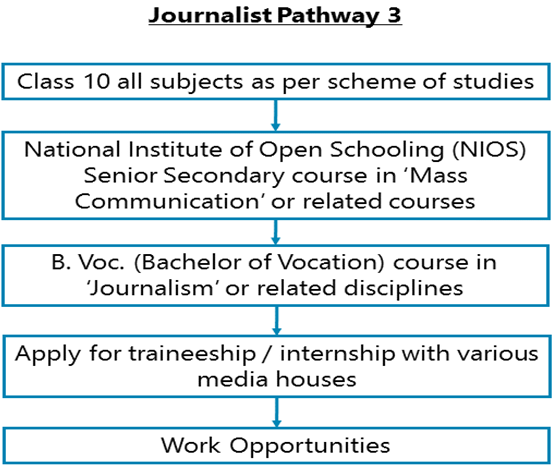
After class 10, you can enroll for National Institute of Open Schooling (NIOS) Senior Secondary course in ‘Mass Communication’ or related courses. It is of 1-year duration during your Senior Secondary level. The medium of instruction is both Hindi and English. Then you can go for a B. Voc. (Bachelor of Vocation) course in ‘Journalism’, ‘Journalism and Mass Communication’, ‘Media and Communication’, ‘Digital Journalism’, ‘Broadcast Journalism’, ‘Media Communication’, ‘Corporate Communication’, ‘Digital and Interactive Media Journalism’, ‘Enterprise Journalism’, ‘Journalism Design and Graphics’, ‘Mass Communication’, ‘News Reporting and Writing’, ‘Media Management’, ‘Media Relations’, ‘Crisis Communications’, ‘Digital Media’, ‘Interpersonal Communication’, ‘Media Management’, ‘Communication Research’, ‘Radio Journalism‘ or related disciplines. Then you can apply for graduate schemes/traineeship/ internship with various media houses.
Required Qualification & Competencies
After class 10 with any subjects, you can go for:
1. NIOS courses.
2. Class 11-12.
After Class 11-12, you can go for:
1. B. Voc. courses.
2. B.C.J, B.M.M, B.J, B.J.M.C courses.
Various private/public vocational training establishments across India offer related courses on:
1. Advertising and Mass Communication
2. Journalism & Mass Communication
3. Mass Communication
4 . Mass Media Studies
5. Art Communication and Journalism
6. Broadcast (Radio & TV) Journalism
7. Convergent Journalism
8. Journalism
9. Journalism & Mass Communication
10. Online Journalism & Blogging
11. Photojournalism
MINIMUM EDUCATION REQUIRED | MAXIMUM EDUCATION REQUIRED |
Post Higher Secondary Diploma / Certificate Programs for which the minimum eligibility is a pass in Higher Secondary / Class XII School Leaving examination. | Post Graduate Postgraduate Degree / Diploma / Certificate Programs for which the minimum eligibility is a pass in Graduation / equivalent Diploma program like Honours Diploma or Graduate Diploma. |
Competencies Required
1. You should have interests for Artistic Occupations. Artistic occupations mostly involve working with creative ideas, art, and designs. These occupations involve abstract or conceptual thinking, creative self-expression and often do not follow any set processes or rules for getting things done.
2. You should have interests for Enterprising Occupations. Enterprising occupations involve taking initiatives, initiating actions, and planning to achieve goals, often business goals. These involve gathering resources and leading people to get things done. These require decision making, risk-taking, and action orientation.
3. You should have interests for Investigative Occupations. Investigative occupations involve working with ideas and quite a lot of thinking, often abstract or conceptual thinking. These involve learning about facts and figures; involve the use of data analysis, assessment of situations, decision making and problem-solving.
4. You should have knowledge of English Language or other language of your choise - Knowledge about grammar, words, spelling, sentence construction, using English / other languages to communicate with others, reading in English and other languages, etc.
5. You should have knowledge of Communications and Media - Knowledge of how different media such as print, television, radio, and social media works; how to produce content such as news, articles, audio-visual programs, etc. for different media. This includes various ways to inform and entertain people via print, audio, audio-visual and online media.
6. You should have Active Listening Skills - Giving full attention to what other people are saying, understanding the points being made by others, asking questions, etc.
7. You should have Reading Comprehension Skills - Skills in understanding written sentences and paragraphs in work related documents.
8. You should have Social Media Skills - Skills in using various social media such as Facebook, Twitter, and Instagram for professional work.
9. You should have Active Learning Skills - Focused and continuous learning from various sources of information, observation and otherwise for application in getting work done.
10. You should have critical thinking skills- Skills in the analysis of complex situations, using logic and reasoning to understand the situations and take appropriate actions or make interpretations and inferences.
11. Originality - The ability to come up with unusual or innovative ideas about a given topic or situation, or to develop creative ways to solve a problem.
12. Fluency of Ideas - The ability to come up with a number of ideas about a topic (the number of ideas is important, not their quality, correctness, or creativity).
13. You are mostly impulsive in your action and behaviour.
14. You are always imaginative or in most situations.
15. You act independently sometimes but do not do so in some other times.
16. You prefer to experience new things and have new experiences sometimes.
Career - Job Opportunities & Profiles
You will get job opportunities as a Journalist in companies such as NDTV, Discovery, BBC, CNN, The Times of India, the Indian Express and The Economic Times or other regional/national:







1. Newspapers publishing companies
2. Magazines and periodicals publishing companies
3. Media conglomerates that are in the business of both print, audio-visual media, online media and radio
4. News agencies
Companies that publish online news portals
1. Radio Stations
2. Television Companies
3. Periodical Publishers
4. Journal Publishers
You may get roles like:
1. Reporter/Journalist
2. Sub-editor
3. Features Writer
4. Investigative Journalist
5. Photojournalist
6. News Reader
7. Copy Editor
8. Anchor/Announcer
9. Web Page content developer
You may also work as a freelance journalist/copyeditor but you have to maintain wide industry contacts in order to work independently.
Specialisation Tracks in This Career
1. Journalist (Electronic Media)
Journalists working in radio or audio-visual (television) media are often referred to as Electronic Media Journalists. Typically, unlike print media journalists, they report from the spot of an incident or event along with a photographer. Apart from reporting from the spot, they work in the desks in television or radio studios and edit audio-visual clips or audio clips. They write all the text that appears on news channels or are broadcast over the radio. They may make video or audio clips from various news sources such as field reports, news agency reports, websites, etc.
2. Journalist (Print Media)
Print Media Journalists work in print mediums such as newspapers, magazines, periodicals, etc. They may work in various beats (a beat means a specialised area of reporting such as crime, political, sports, business, etc.) and report on various incidents, events, situations, etc. They may also work in the desks in the offices and work as copy editors, sub-editors, editors, etc. They write or edit news stories, features, etc. and make the pages of newspapers, magazines, etc.
3. Journalist (Online media or Web)
In this specialised area, journalists work for web publications. There are many news portals on the web. Journalists working for web media mostly compile news stories and features from various news agency sources and other web sources. They write the stories and features and then publish the stories online.
4. Journalist (Public Affairs)
Public affairs constitute the core of journalism. It essentially focuses on the reporting of public issues such as government policies, electoral politics, economic growth and development, budget and taxation, military and defense, and various other matters that concern the common people.
5. Sports Journalist
As the name suggests, Sports Journalists focus on reporting the latest news and stories from the world of sports. Sports journalists write about and report on both amateur and professional sports. Their job duties include tasks like reporting a live game/sports competitions, interviewing players and coaches, performing game commentary, sports analysis, etc.
6. Blogger (News)
News Bloggers work independently and either write news stories or shoot videos for their own blogs or write for web news portals as freelance journalists.
7. Blogger (Features)
Bloggers who write features (which may include opinion, news analysis, stories on social, economic, politics and other aspects as well as videos) either write for their own blogs or work as freelance journalist for web media.
8. Freelance Journalist/Writer
Freelance Journalists and Writers work on a freelance basis for print media, web or electronic media. They may write news stories and features or may shoot photographs/videos to go with their news stories and features. Depending upon the kind of assignment they get, they may also accompany photographers and build the stories jointly.
Career Growth
From entry-level job positions as Trainee Reporter/Journalist, you may grow into roles like Reporter, Copy Editor, Sub-Editor, Assistant Editor, Associate Editor, Columnist, Correspondent, Editor, etc.
Salary Offered
1. Salaries vary according to job profiles and the kind of facilities you get to work at.
2. In the entry-level jobs: You may get about. Rs. 12,000 – Rs. 20,000 or more per month.
3. Salaries increase with your work experience and as you get promoted.
4. After having 1-6 years of experience, you may expect about Rs. 15,000 – Rs. 40,000 per month or more.
5. After having 6-12 years of experience, you may get about Rs. 20,000 – Rs. 75,000 per month or more.
6. In the senior level jobs, with 12-20 years of work experience, you may expect to get about Rs. 35,000 – Rs. 5,00,000 per month or even more depending upon your position and the company you are working with.
Monthly Earning In Indian Rupee
Entry Level | Junior Level | Mid-Level | Senior Level | |||||
Min Earning | Max Earning | Min Earning | Max Earning | Min Earning | Max Earning | Min Earning | Max Earning | |
12000 | 20000 | 15000 | 40000 | 20000 | 75000 | 60000 | 500000 | |
1. Entry level: 0 - 2 years of work experience
2. Junior Level: From 1 to 12 years of work experience
3. Mid-Level: From 5 to 20+ years of work experience
4. Senior Level: From 10 to 25+ years of work experience (there could be exceptions in some high-end technical, financial, engineering, creative, management, sports, and other careers; also in the near future, people will reach these levels much faster in many careers and in some careers, these levels will have no meaning as those careers will be completely tech skill driven such as even now, there is almost no level in a Cyber Security Expert’s job)
Work Activities
1. Getting Information and learning - Observing, hearing, reading, using computers, or otherwise obtaining information and learning from it.
2. Analysing and interpreting data and information - Analysis of data and information to find facts, trends, reasons behind situations, etc.; interpretation of data to aid in decision making.
3. Identifying objects, actions, and events - Identifying various characteristics of objects; observing and understanding actions and events; understanding changes in actions and events.
4. Translating and interpreting - Translating or interpreting information for other people who are written or spoken in languages that other people do not understand.
5. Processing information - Searching, compiling, tabulating, calculating, auditing, verifying or otherwise dealing with information processing including data entry, transcription, recording, storing and maintaining databases.
6. Working with computers, programming and performing technical tasks– Using computers and computer systems, hardware, and software for designing computer applications, mobile applications etc.
7. Communicating with co-workers and others– Communicating with people in writing, verbally or otherwise inside your workplace and various other people who have professional relationships with your place of work.
8. Presenting and demonstrating work to others – you will need to present and demonstrate your work to others such as clients, co-workers, and superiors.
9. Creative thinking - Developing new ideas, concepts, innovative solutions to problems, newer ways of getting things done, designing products and services and creating effective, user-friendly and appealing products.
10. Working in a team - Working in a multi-disciplinary team of people; developing a team; maintaining professional relationships among team members.
Future Prospects
Indian Media and Entertainment Industry has experienced decent growth. The Television industry is expected to grow in terms of employment volume to 0.64 million from 0.28 million in 2017, translating to a human resource requirement of 0.36 million. The Print Media industry is expected to grow in terms of employment volume to 0.13million from 0.07million in 2017, translating to a human resource requirement of 0.06 million.
The radio industry is expected to grow in terms of employment volume to 0.04 million from 0.03 million in 2017, translating to a human resource requirement of 0.01 million. The overall industry growth of Media and Entertainment Sector has been estimated at a rate of 13.10% compounded annually to touch the mark of 39.68 billion US Dollars by 2023 from 22.28 billion US Dollars in 2018. India’s media consumption has been growing at a rate of 9% in the period 2012-2018 compounded annually. This is 9 times that in the US and 2 times that in China. Viewership in the regional entertainment segment is constantly surging and the south Indian television industry is one of the oldest television sectors in India that is still operational and expanding. All these growth figures indicate a bright future for people aspiring to work in the media industry.
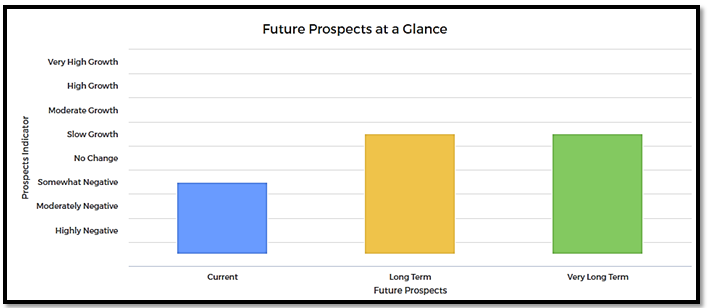
Future Prospects At A Glance
Current (0-1 year) | Long Term (2-5 year) | Very Long Term (6-10 years) |
Somewhat Negative | Slow Growth | Slow Growth |

